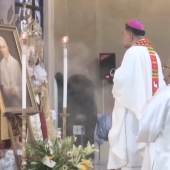Pope Francis: A Global Champion for Migrants and Refugees

Pope Francis has emerged as one of the world’s strongest voices for migrants and refugees. From his first papal visit to Lampedusa in 2013, where he mourned those lost at sea, to welcoming refugee families into the Vatican, his actions have always reflected his words.
“Migrants and refugees are not pawns on the chessboard of humanity,” he declared with clarity and compassion.
Grounded in the gospel: "I was a stranger, and you welcomed me" (Matthew 25:35). Pope Francis framed the Church’s mission through four guiding verbs: welcome, protect, promote, and integrate. Under his leadership, the Vatican established the Migrants and Refugees Section, placed directly under his authority, highlighting the urgency and personal importance of this mission. He also elevated Cardinal Michael Czerny, a Jesuit known for his hands-on work with displaced populations, signaling the Church’s deep pastoral commitment.
In Fratelli Tutti, his encyclical on fraternity and social friendship, Pope Francis warns against nationalism, xenophobia, and the “globalization of indifference.” His annual World Day of Migrants and Refugees messages have emphasized the dignity, potential, and God-given rights of the displaced, turning the Church’s gaze outward to the peripheries.
His message continues to resonate in India, where internal migrants and refugees from neighboring countries face social and economic exclusion, and in the Middle East, where war and persecution have uprooted millions. In 2021, his historic visit to Iraq brought hope to Christian minorities and sent a powerful call for peace and interfaith solidarity.
Pope Francis’ commitment wasn’t merely pastoral; it was structural. One of his landmark contributions was the inclusion of women in positions of leadership within Vatican Dicasteries, including those addressing migrants and refugees. This broke new ground in a traditionally male-dominated hierarchy, affirming that the voices of women, especially those working at the grassroots, are vital to building a just and inclusive Church.
Many close collaborators and advocates in the field have paid tribute to Pope Francis’ legacy.
Fr. Jaison Vadassery, Executive Secretary of the CCBI Commission for Migrants, said: “With deep sorrow, I mourn the passing of Pope Francis. For me, he was not only the spiritual head of the Church but truly the champion of world peace and the protector of the poor and marginalized, especially migrants, refugees, and internally displaced people. I had many opportunities to meet him during events organized by the Vatican for migrants and refugees. His genuine warmth, deep compassion, and unwavering love for those on the margins will never be forgotten. His legacy of love and justice will forever guide us.”
A religious priest from Rome reflected, “Since the beginning of his pontificate, Francis has charted a clear course: a Church capable of welcoming, protecting, promoting, and integrating. His first apostolic journey to Lampedusa left an indelible mark. ‘Who has cried for these dead?’ he asked in a firm voice, condemning the global numbness toward migrant suffering.”
Sister Carmen Elisa Bandeo SSps, from the International Union of Superiors General (UISG), shared, “As a consecrated woman from Argentina, with the same migratory roots as Pope Francis, I admired his deep connection to where he came from. His identity shaped his universal compassion. Putting the person at the center, seeing each human being as a brother or sister, and loving them as Jesus did was his most vital contribution."
Ms. Christine Nathan, president of the International Catholic Migration Commission (ICMC), called him a “shepherd of the uprooted.”
“He always challenged and appealed to world leaders to shape migration policies. His advocacy, especially through the Holy See’s participation in international bodies like the ILO, brought moral and spiritual clarity to the discussion on social justice and inclusivity," added Nathan.
Fr. Francis Bosco, Director of Don Bosco for Migrants, Delhi, said, “In a time of growing walls and shrinking compassion, Pope Francis stood as a bridge-builder, a voice of conscience, and a father to the forsaken. He was the Pope of the Poor, the Migrants, and Mercy. His papacy reoriented the Church to walk hand in hand with justice.”
Ms. Bridgette, a volunteer with the Commission for Migrants in Delhi, noted how the Pope’s teachings shaped her mission: “He motivated me to serve others. I follow his message through community work with migrants and refugees in our diocese.”
She highlighted how Pope Francis encouraged spiritual values such as prayerfulness, scripture-based living, perseverance, discernment, and community engagement, all rooted in generosity and justice.
Through his prophetic voice and tireless witness, Pope Francis didn’t just guide the Church; he awakened the world’s conscience. His legacy serves as a reminder that faith cannot be complete without compassion, and the Church's heart must always be filled with love for the most vulnerable.
Fr. Stan Alla, Professor of Vidyajyoti Theologate, said, “Pope Francis gave migrants a face, a name, and an identity, reminding us we are sojourners with shared responsibility. He urged us to build bridges, not walls that divide, placing human dignity at the heart of the Church’s guide.”
Radio Veritas Asia (RVA), a media platform of the Catholic Church, aims to share Christ. RVA started in 1969 as a continental Catholic radio station to serve Asian countries in their respective local language, thus earning the tag “the Voice of Asian Christianity.” Responding to the emerging context, RVA embraced media platforms to connect with the global Asian audience via its 21 language websites and various social media platforms.














